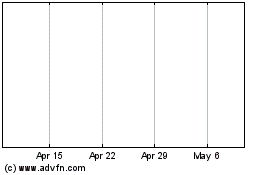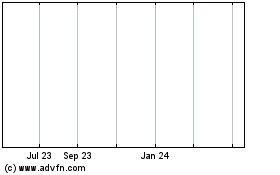Samsung Eyes Up to $17 Billion U.S. Chip-Plant Investment
23 January 2021 - 11:47AM
Dow Jones News
By Elizabeth Findell, Asa Fitch and Elizabeth Koh
South Korea's Samsung Electronics Co. is considering an
investment of as much as $17 billion to build a chip-making factory
in Arizona, Texas or New York, according to documents and people
familiar with the company's plans.
Samsung is scouting two locations in and around Phoenix, two
locations in and near Austin and a large industrial campus in
western New York's Genesee County, according to one of the
people.
An important factor in whether Samsung moves forward with the
expansion will be the availability of U.S. federal government
incentives to offset those offered by foreign countries and cheaper
costs in other parts of the world, according to a person familiar
with the matter.
The proposal comes as the U.S. weighs allocating billions of
dollars in funding to grow U.S. chip manufacturing and reduce its
reliance on Taiwan, China and South Korea. New chip-making
incentives were included in the National Defense Authorization Act
passed in January, although the measures have yet to receive
funding.
Samsung's proposed plant would employ up to 1,900 people and
aims to be operational by October of 2022, according to
correspondence viewed by The Wall Street Journal between Samsung
and the city manager of Goodyear, Ariz., one of the places the
company is considering. As is customary with large industrial
projects, the local Goodyear authorities are offering a range of
incentives, including tax breaks and infrastructure upgrades to
lure the factory, according to the letter.
The U.S. has historically not offered federal aid for chip
plants. But the coronavirus pandemic highlighted how disruptions in
the global supply chain could interrupt the flow of key ingredients
needed to make vital technologies ranging from 5G smartphones to
jet fighters, and sparked U.S. interest in becoming more
self-sufficient.
With the rise of the chip industry in Asia over recent decades,
the U.S. share of chip manufacturing has fallen to around 12%,
according to a Boston Consulting Group report last year.
It said significant new financial help would be needed for the
country to reverse the trend.
Samsung didn't immediately respond to a request for comment.
Samsung's move would follow last year's blockbuster chip-making
investment decision by rival Taiwan Semiconductor Manufacturing Co.
TSMC said it would build a plant north of Phoenix and in December
bought land for the $12 billion project.
TSMC is a contract chip manufacturer, meaning it makes chips
according to others' designs. Samsung has a contract chip-making
business that would be the focus of its new U.S. plant, but it also
has an array of its own consumer products that use chips coming
from its factories.
Samsung has had chip-making facilities in Austin since the
1990s, and has expanded there over the years. The company bought
additional land near its existing facilities last year, according
to local land records. Next week, it is asking local officials to
relocate a roadway near those facilities, according to a City
Council agenda. Discussions about development incentives for the
project have appeared on agendas of public entities in Austin and
the nearby city of Taylor.
Officials in Texas, Arizona and New York either declined to
comment or didn't respond to requests for comment.
Bloomberg earlier reported Samsung was considering investing $10
billion or more in a facility in Austin.
A wave of new U.S. chip-plant developments add to changes taking
place across the semiconductor industry.
Intel Corp., the U.S.'s leading chip maker, has fallen behind
foreign rivals and plans to outsource production of more of its
most advanced chips to factories in Asia. Intel's embrace of more
outsourcing comes as competitors are chipping away at its
dominance, aided by chips that rival or exceed Intel's in
performance and rising stock prices that are spurring a spree of
acquisitions.
Graphics-chip giant Nvidia Corp. is proposing to buy the British
chip-design company Arm Holdings for $40 billion in what would be
the largest-ever deal in the industry. Intel rival Advanced Micro
Devices Inc. and Analog Devices Inc. are poised to gain heft
through their own megadeals on the horizon.
Samsung has largely sat out the rapid consolidation. Its
leadership is in fresh disarray after the company's vice chairman
and de facto leader Lee Jae-yong returned to prison Monday,
following a Seoul appeals court's retrial in a long-running bribery
case. Mr. Lee, the third-generation heir, has been responsible for
ultimately approving all major business decisions.
Write to Elizabeth Findell at Elizabeth.Findell@wsj.com, Asa
Fitch at asa.fitch@wsj.com and Elizabeth Koh at
Elizabeth.Koh@wsj.com
(END) Dow Jones Newswires
January 22, 2021 19:32 ET (00:32 GMT)
Copyright (c) 2021 Dow Jones & Company, Inc.
Samsung Electronics (PK) (USOTC:SSNHZ)
Historical Stock Chart
From Nov 2024 to Dec 2024

Samsung Electronics (PK) (USOTC:SSNHZ)
Historical Stock Chart
From Dec 2023 to Dec 2024
